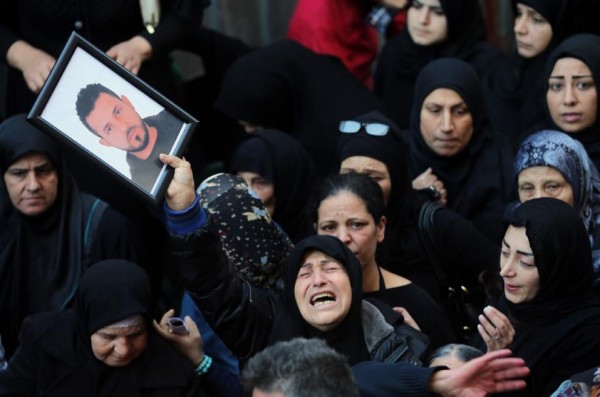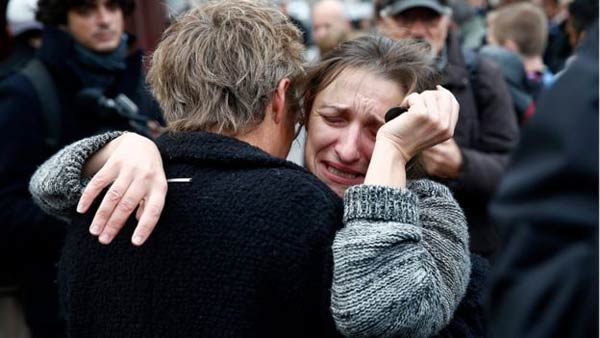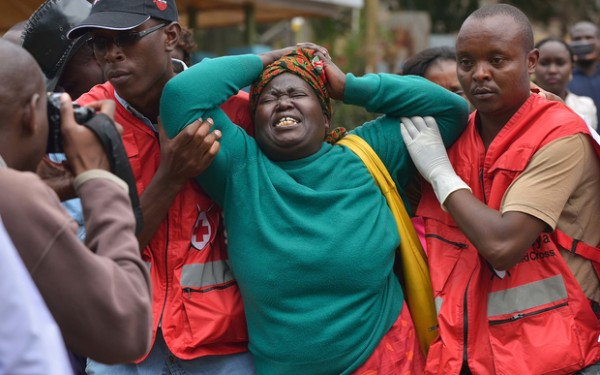
By Jack Mirkinson
The world has banded together in support of Paris in the days following the terrible attacks which left at least 129 people dead.
Everything from iconic buildings to social media logos has been bathed in the colors of the French flag. (Fusion joined this trend.) “Saturday Night Live” paid a moving tribute to the City of Light. All around the globe, it seemed, people were stopping in their tracks to send their love to Paris. The attacks could not be ignored.
Bubbling underneath all of this unity, however, has been a persistent question: why did the world stop for Paris and not, say, Beirut, where ISIS bombs killed 43 civilians just a day before the horrors in France? Where were the minutes of silence, the moment-by-moment news updates of the aftermath, the grim statements from world leaders?

Beirut resident Elie Fares wrote about the discrepancy in a widely shared blog post:
Amid the chaos and tragedy of it all, one nagging thought wouldn’t leave my head. It’s the same thought that echoes inside my skull at every single one of these events, which are becoming sadly very recurrent: we don’t really matter.
When my people were blown to pieces on the streets of Beirut on November 12th, the headlines read: explosion in Hezbollah stronghold, as if delineating the political background of a heavily urban area somehow placed the terrorism in context.
When my people died on the streets of Beirut on November 12th, world leaders did not rise in condemnation. There were no statements expressing sympathy with the Lebanese people.
The conversation around the comparative lack of outrage about Beirut grew loud enough that Facebook was moved to explain why it had turned on its much-lauded safety features only when Paris was attacked. “There has to be a first time for trying something new, even in complex and sensitive times, and for us that was Paris,” Facebook executive Alex Schultz wrote.
Around the same time, there was a sudden appearance of stories about a terrorist assault on Garissa University in Kenya which killed 147 students. The news began trending on both Facebook and Twitter, which was odd, since the attack happened in April. Many people shared it as though it was breaking news, since they hadn’t heard about the attack when it actually took place—a sure sign of just how little the initial news of the attack had penetrated the global consciousness.
All of this leads to some unpleasant questions. It’s easy to lay out the factors that may have contributed to one story gaining prominence over another. More people died in Paris than in Beirut, for instance. The attacks had a terrifying audacity and grandeur about them that couldn’t help but pull people in, and the apparent expansion of ISIS into Europe is a hugely important geopolitical story. (Moreover, we wouldn’t know much of what we do know about what happened in Beirut without dedicated journalistswho risked a great deal to bring us that story.)
But we’d be kidding ourselves if we left it at that. We also have to examine the assumptions about both Paris and Beirut that may be coloring our overall reaction. Beirut is in the Middle East. These things happen there all the time, right? (Wrong, actually — this was the worst bombing of its kind in Beirut since 1990.) And if Beirut—the “Paris of the Middle East”—feels like foreign territory, what chance did Kenya have to get on the international radar, even after the attacks there killed more people than the violence in Paris? Would anybody seriously dispute that if 147 people had been killed at a school in, say, Berlin, the world would have stopped?
Paris, on the other hand, is Paris. It has places and icons everybody knows. Suicide bombings aren’t supposed to happen there. People in Beirut or Kenya may seem like the Other to most Westerners, but the French are one of us.

One of the most positive things about the digital age is that the gap between “other” and “one of us” can be bridged more easily than ever. After a week of almost unendurable tragedy, how good would it be if we redoubled our efforts to close that gap?
FUSION
This is to remind all our readers to respect the community . Comments that contain personal attacks or inappropriate language will be removed.
For those who are new to this site please note that Ya Libnan is all about fixing Lebanon.
We want our readers to come up with ideas that if implemented will make lebanon a better country.
Ya Libnan is a democratic venue that is open to anyone wishing to contribute any ideas to improve Lebanon. Our only wish is to maintain the civility of the discussions and that is why those who have not been able to abide by this rule have been banned from participating in this forum . We don’t want or expect anything from anyone …better lebanon is the only reward we seek. Help us get there!

Leave a Reply
You must be logged in to post a comment.